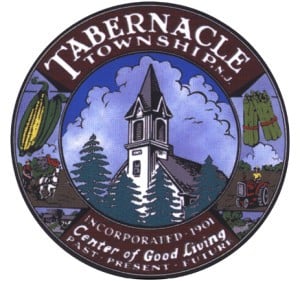
Though the cleanup from the June 23 storm is still very much in effect, the Tabernacle Emergency Services group made a valiant effort to limit the damages.
Emergency Management Coordinator Colonel William Lowe presented a detailed report recapping the storm at last week’s township committee meeting.
The report was on the first 48 hours because that’s what FEMA will reimburse for if the FEMA declaration comes through.
Over this period, they logged 105 hours among four personnel from public works, 228 hours among 27 personnel from the fire company and 275 hours among 25 personnel from the rescue squad.
The fire company was dispatched 19 times and the rescue squad was dispatched 58 times.
By the time they were finished, they had identified 39 downed wires for Atlantic City Electric.
There was $852,000 in total damage costs, the majority relating to debris removal.
“I think what’s really important here is that in emergency services, we realized right up front that we had a problem,” Lowe said.
This storm that originally started north came through Tabernacle at about 75 miles an hour and lasted about 15 minutes.
“When it started at one end, we were perfectly normally. By the time it had gone through, Tabernacle was dark, the entire township,” Lowe said.
So the emergency management group got together and opened the emergency operations center.
“For the first time in a long time, I had a complete EOC, which means I had an operations officer,” Lowe said.
This caused problems because the operations officer thought he was supposed to be telling people what to do and Lowe thought he was supposed to be telling people what to do, so they had cross-references. In fact, it came out a couple times they sent the fire company to the same site three times.
“That was probably the biggest problem that we had that night,” Lowe said.
In a four-hour period, the public works unit, the fire company and the rescue squad drove every road, clearing anything they could, identifying any fallen wires, any hazards, any life threats and sending that all to the EOC, which then sent the information to Atlantic City Electric and wherever else it needed to go.
Everything was run entirely out of the EOC.
“I think it was fascinating what we did. It was fascinating what we asked these volunteers to do and the fact that they went out and they did it,” Lowe said.
They had the operation open until Sunday afternoon to give out water, allow folks to charge their phones, and even just come in and talk.
“You cannot believe the way the emergency services worked together, whether it was the fire company, or the rescue squad, or the public works, you cannot believe the way they worked together. The fact that they worked so well together shows that the results of this storm were not as bad as they could have been,” he said.
When a survey went out the following Saturday, only 19 houses reported having had any major damage from the storm.
“We’ve sat up here the last few meetings and praised you guys and it’s worth repeating, you guys did an outstanding job,” Deputy Mayor Richard Franzen said.
Lowe concluded his presentation with a few recommendations and things to do differently in the future when faced with a scenario such as this. One recommendation he emphasized was the idea of the emergency management group needing to have a contingency fund.
“We’ve talked about it before,” Lowe said. “We need to budget out a certain amount of money that OEM can go to and draw that money, not from the normal budget, but for emergency operations.”
Another suggestion dealt with creating an OEM Facebook page to tighten up the communication in emergencies and to broaden the group of people it can reach with other information throughout the year.
This idea will be discussed by the committee and a decision will be made on how this development will come to fruition.









